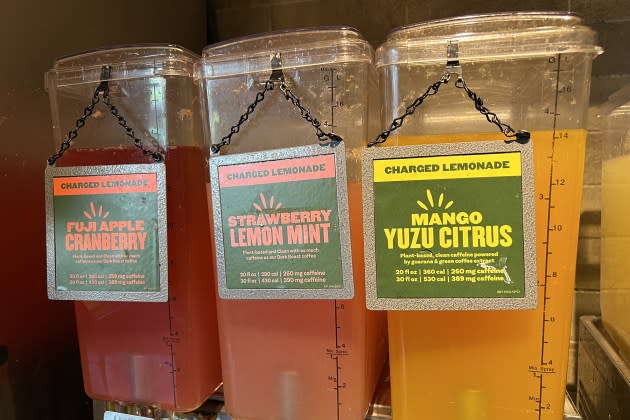TikTok Warned You About Panera Charged Lemonade. Then Someone Died

The Food and Drug Administration is “gathering information” on the national fast-casual chain Panera after a 21-year-old died shortly after drinking the restaurant’s Charged Lemonade. Increased public scrutiny has led Panera to update the drink’s warnings, prominently displaying that the beverage is not for people with caffeine sensitivities. But while the company says the Charged Lemonade has always had its caffeine limit listed, online users have been warning each other about the drink — and its potentially dangerous side effects — for months.
Sarah Katz, a 21-year-old student at the University of Pennsylvania, died after drinking a Panera Charged Lemonade, “reasonably confident it was a traditional lemonade and/or electrolyte sports drink containing a reasonable amount of caffeine safe for her to drink,” according to a lawsuit filed last week by her parents, Michael and Jill Katz. The lawsuit also stated that Sarah was diagnosed with Long QT Type 1 Syndrome when she was 5 years old, a heart condition that can cause arrhythmias or abnormal heart rhythms when subjected to heavy physical exercise or energy drinks. The student, who family and friends say always avoided energy drinks and had regular healthy checkups with doctors, consumed a Charged Lemonade on Sept. 10, 2022, before going into cardiac arrest and later dying.
More from Rolling Stone
'Fake Bullshit Shows': Guess Who Co-Founders Sue Ex-Bandmates
Lizzo Asks Court to Dismiss Ex-Dancers' Sexual Harassment Lawsuit as 18 Staffers Back Her
The drink has 390 milligrams of caffeine, which is close to the amount of caffeine in three Red Bulls, but Panera’s language on its website and the in-store stickers on the container compared it to the same caffeine as a cup of their dark roast coffee. According to the Panera website, a dark roast coffee can range from 161 to 268 milligrams depending on size but has no added sugar. A spokesperson for Panera did not respond to Rolling Stone’s request for comment but said in a statement to NBC News that they are investigating the incident. The FDA also announced that they are “gathering information” on the case and drink but did not respond to Rolling Stone’s request for comment.
While the Katz lawsuit is new, the allegations in the suit mirror online commentary surrounding the drink. On TikTok, the top 45 videos using the Charged Lemonade hashtag contain warnings from people who had the drink and experienced trouble sleeping, rapid heartbeats, shaky hands, and more. “This is not an ad, this is a warning,” said one user’s video. “Paying $4 for a Panera lemonade with 390 mg of caffeine to go into V-tach while I’m studying instead of taking Adderall,” another user captioned their TikTok, calling the lemonade “borderline unethical” in the comments.
The warnings continue on the r/Panera subreddit, where posts occurred so frequently that users joked there were concerns about the drink every “7 business days.”
The lawsuit alleges that Panera exposed customers to “increased risk of injury” by not marketing the drink as an energy drink and including it in their Unlimited Sip Club promotion, where customers pay a flat fee for an unlimited amount of drinks. It also notes that the Charged Lemonade flavors are mixed in-house by Panera employees and are included on the beverage displays next to options with less or no caffeine, leading to possible confusion about which beverages contain higher amounts of caffeine.
In a statement to Rolling Stone, attorney Elizabeth Crawford, who is representing the Katz family, says Panera’s new warning signs are a start but still “fall short” of safety measures.
“Panera’s warning to drink caffeine in ‘moderation’ is an impossibility to follow given the potency of the drink, the size of the drinks they sell, and the fact they are part of the Unlimited Sip Club,” Crawford says. “The Katz family is pleased to hear that the FDA is investigating the situation and believes that they will determine that this super energy drink is dangerous for consumption and begin to regulate energy drinks in the United States for the first time in order to save lives. The Katz family knows that this change will not bring back their daughter, but it would help to save future lives.”
Best of Rolling Stone
